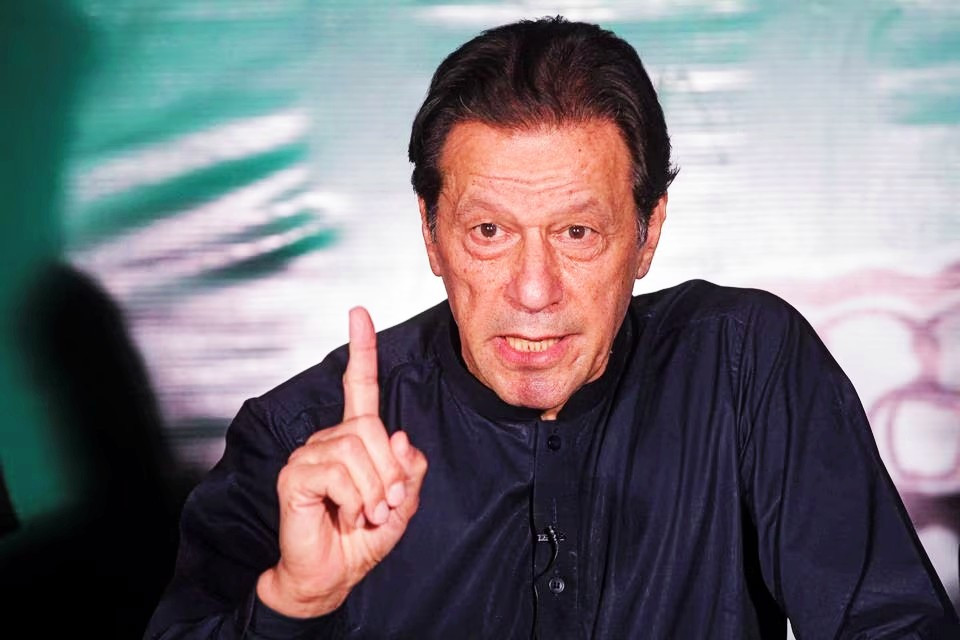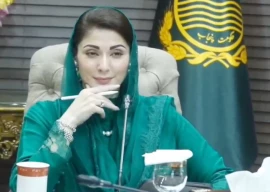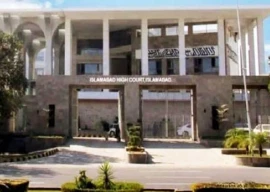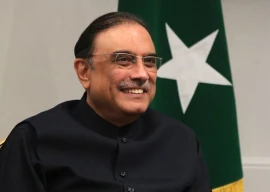
The Supreme Court (SC) on Tuesday granted permission to former prime minister and Pakistan Tehreek-e-Insaf (PTI) founder Imran Khan to appear in the court via video link in the National Accountability Bureau (NAB) law amendments case.
A five-judge bench led by Chief Justice Qazi Faez Isa and including Justice Aminuddin Khan, Justice Jamal Khan Mandokhail, Justice Athar Minallah, and Justice Syed Hasan Azhar Rizvi, heard the federal government's intra-court appeal.
The federal government has challenged the apex court’s majority verdict in September last year, declaring amendments to the National Accountability Ordinance (NAO) 2002 illegal. Tuesday’s proceedings were telecast live on the apex court's website.
At the outset of the hearing, both NAB prosecutor general and the lawyer representing the Punjab government stated that they would adopt the federal government's arguments in the case. However, Khyber-Pakhtunkhwa (K-P) advocate general opposed the intra-court appeals.
During the hearing, Justice Athar Minallah said that the court had been informed that the PTI founder wanted to appear in person, adding that the PTI founder was the petitioner in main case; therefore, he should be facilitated via video link.
The chief justice remarked that in the court order there was a mention of representation by lawyer. He also said that the current matter was about amendments to the provisions of the act. He then adjourned the court for five minutes.
When the hearing resumed after a short break, the court allowed Imran to appear from Adiala Jail via video link. The court instructed that the federal government and the Punjab government should provide video link facility to Imran in Adiala Jail.
Read SC to hear govt’s NAB amendment appeal
During the proceedings, the court sought details of the expenses incurred on NAB and its annual recovery. The court also sought details as to how many politicians went to jail in NAB cases and how many were found to be innocent.
Advocate Farooq H Naek, who represented an individual affected by NAB, argued that the main constitutional petition filed against the NAB amendments was inadmissible, as the Supreme Court heard the matter while the Practice and Procedure Act case was being heard.
Justice Minallah agreed with the argument of Naek and said that the NAB amendments case should have been heard by a larger bench. He added that the amendments were also challenged in various high courts under Article 184(3) and no plea could be heard when the matter was pending in high courts.
Justice Minallah said that Khawaja Haris should be appointed amicus curie. However, the chief justice stated that a neutral lawyer was appointed amicus curie, whereas Haris was the counsel for the petitioner in the main case.
Makhdoom Ali Khan, the lawyer of the federal government, said that Supreme Court’s majority decision to nullify the NAB amendments was not correct. He added that the main petitioner, Imran Khan, neither approached the court in good faith nor was he affected by the NAB amendments.
During the PTI government, Khan said, amendments were made to the NAB Act through a presidential ordinance. After the no-confidence motion, he continued, the new government retained the amendments made by through ordinances.
Further hearing of the case was adjourned till May 16. Later, in its written order, the court stated that all the provinces and the federation supported the intra-court appeals except K-P. The order further stated that details had been sought from NAB about how many cases had been investigated so far.
NAB was asked to inform the court about the number of cases in which NAB court convictions were upheld by the high court or the Supreme Court, the money recovered by it so far and in which bank account it was kept, and whether NAB took any share from the recovered amount.
The order said that the PTI founder had written that he would himself give arguments. It added that federal and the Punjab governments should provide video link facility to the PTI founder in Adiala Jail. The order clarified that it did not mean that the PTI founder was not being allowed to speak in the court.


1725784957-0/Tribune-Pic-(17)1725784957-0-165x106.webp)
1724760612-0/Untitled-design-(12)1724760612-0-165x106.webp)

















COMMENTS
Comments are moderated and generally will be posted if they are on-topic and not abusive.
For more information, please see our Comments FAQ